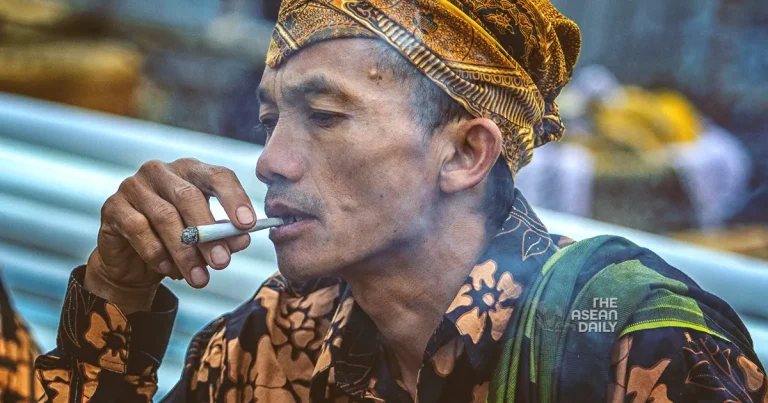12-2-2024 (JAKARTA) Cigarette production is in full swing at the PT Mustika Tembakau Indonesia factory, where Mdm Rosalina is working tirelessly to meet the increased demand for cigarettes as Indonesia gears up for its upcoming elections on Feb 14.
As the campaign season progresses, the demand for cigarettes rises, prompting Mdm Rosalina to ensure that her factory can keep up. Known by her first name, she explained, “The demand starts to increase during the campaign season, and it will last for a few months.”
Since the start of the campaigning in November, Mdm Rosalina has already witnessed a 10% increase in demand compared to regular months. Typically, she produces about 400 boxes of cigarettes per week, but during the election season, the number has risen to around 500 boxes. Each box contains approximately 500 packs of cigarettes.
The Indonesian government anticipates a positive impact on the country’s economy during election periods. “There will be a positive impact from the upcoming elections,” stated Perry Warjiyo, the governor of Bank Indonesia, during a press briefing on Dec 21. According to Mdm Dian Ayu Yustina, an economist with Bank Mandiri, sectors such as food and beverage, telecommunications, transportation, and domestic manufacturing are likely to experience increased demand and profit during the election season.
Explaining the reasons behind the surge in demand, Mr Adik Dwi Putranto, the head of East Java’s chamber of commerce and industry, highlighted the prevalence of gatherings during the campaign period. Indonesians tend to gather as candidates promote their agendas, and cigarettes are often served during these gatherings. Mr Adik also pointed out that coffee consumption rises during the campaign season because cigarettes and coffee are often enjoyed together.
In the previous presidential election held in 2019, cigarette production averaged about 29.6 billion sticks per month during the campaign season, compared to 24.36 billion sticks the year prior, according to data from Indonesia’s customs and excise agency. Similarly, the consumption of coffee increased from 314,365 tons in 2018 to 335,540 tons in the election year of 2019. Business people hope for a positive impact on the economy, as individuals and political parties tend to spend significant sums during campaigning.
The Indonesian Election Commission (KPU) released the initial campaign funds of political parties on Jan 14, revealing that the ruling party, The Indonesian Democratic Party of Struggle (PDI-P), has the largest budget, followed by the Indonesian Solidarity Party (PSI). As of mid-January, PDI-P has spent 115 billion rupiah, while PSI has spent 24 billion rupiah.
Governor Perry Warjiyo of Bank Indonesia stated at a press briefing that the upcoming presidential and legislative elections will contribute to the country’s economic growth. While the Indonesian economy grew 5.05% in 2023, he forecasted a growth of up to 5.5% this year. Three pairs of presidential and vice-presidential candidates are running for the election, with the requirement of securing over 50% of the votes to win. In the event that no pair meets the requirements, the two pairs with the most votes will proceed to a second round of voting in June.
Aida Budiman, the deputy governor of Bank Indonesia, explained at the same press conference that the elections would boost economic growth through increased domestic consumption, which is the main driver of Indonesia’s economy. She emphasized that not only household spending but also government spending on technical needs related to the elections, such as procuring ballot boxes and logistics transportation, would contribute to domestic consumption. Mdm Aida estimated that if there are two rounds of voting, household consumption could see an additional growth of around 0.6%.
As businesses anticipate the surge in demand, Mdm Rosalina, the owner of Mustika Tembakau Indonesia, mentioned that during previous elections, demand for her products increased by 30%. However, meeting the demand can be challenging due to issues like obtaining enough tobacco. To address this, Mdm Rosalina has secured as much tobacco as possible before the campaigning period began in November.
Indonesia has the third-highest number of smokers globally, with approximately 112 million smokers, according to government data. While the government has been encouraging people to quit smoking due to health risks, it also relies on the tobacco industry for about 10% of its state revenue. Mdm Rosalina believes that smokers should be aware of the health consequences, as they are printed on cigarette packs. She acknowledges that cigarettes significantly contribute to the country’s income.
In East Java, the main cigarette-producing province in Indonesia, Mdm Sulami Bahar, the head of the cigarette entrepreneur association (Gapero), revealed that legislative candidates often make special requests to small-scale cigarette factories during elections.During the campaign season leading up to the upcoming elections in Indonesia, there is an increased demand for cigarettes. This surge in demand is attributed to various factors such as gatherings during campaign events where cigarettes are served, the association of cigarettes with coffee consumption during election periods, and the overall increase in spending by individuals and political parties during campaigning.




